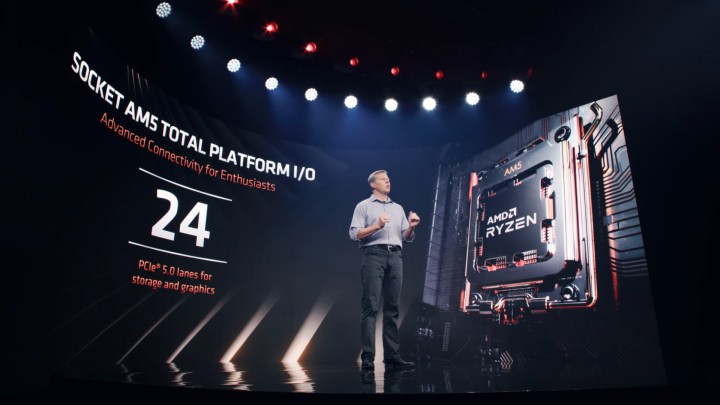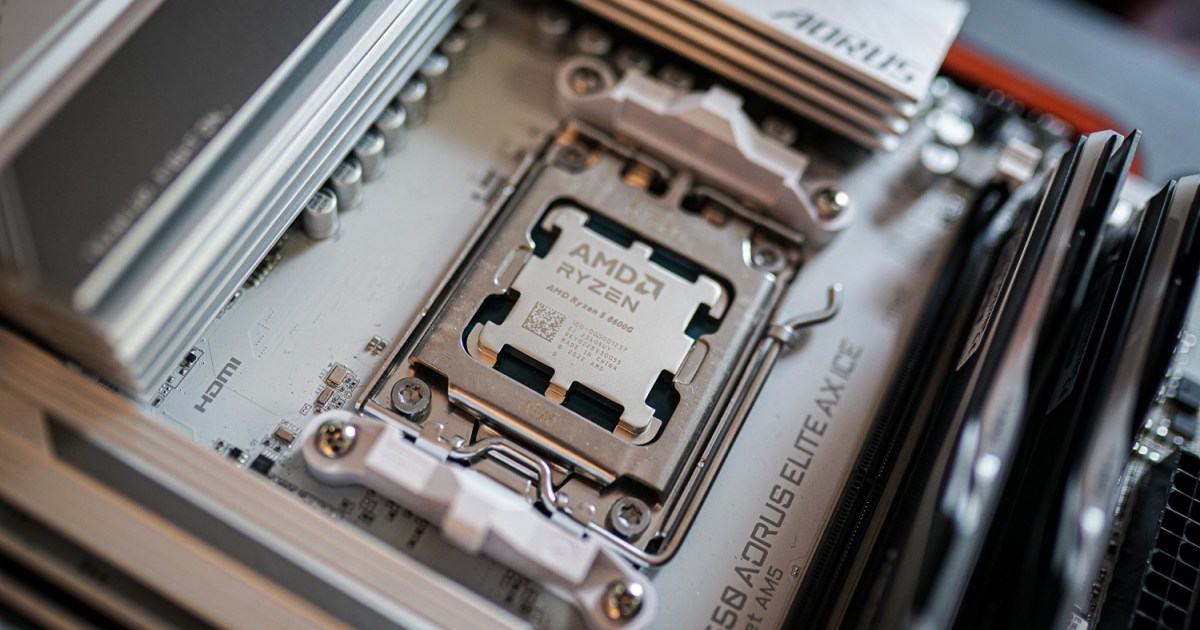AMD Zen 5 is the next-generation Ryzen CPU architecture for Team Red and is slated for a launch sometime in 2024. We’ve been hearing tantalizing rumors for a while now and promises of big leaps in performance. In short, Zen 5 could be very exciting indeed.
We don’t have all the details, but what we’re hearing is very promising. Here’s what we know about Zen 5 so far.
Zen 5 release date and availability
Looking at AMD’s road map and plans to add 3D V-Cache to Zen 5 CPUs as a mid-generation refresh, we’d expect those chips to show up in Spring 2025 (perhaps after a CES unveiling) if they follow the same timeframe as Zen 4’s 3D V-Cache chips, like the excellent 7800X3D.
Zen 5 specs
AMD hasn’t released any raw specifications for Zen 5 just yet, though we do have some confirmations of specific specs and rumors about what we can expect from this next generation of processors.
Reported leaks point to a maximum of 16 cores on the Zen 5 generation, mirroring what’s currently available for Zen 4. There are also rumors of limited or non-existent clock speed improvements, which isn’t unheard of in a new-generational architecture, but it is less common.
Without new cores or higher clocks, AMD will rely on architectural improvements to boost performance, and reportedly, they’ll improve it by quite a lot. Strong rumors in January 2024 point towards Zen 5 having instructions per clock (IPC) improvements of up to 30%. If that proves even close to true, it would be the largest inter-generational IPC increase since the debut of AMD’s original Zen generation in 2017.

Other rumors suggest Zen 5 will offer native support for slightly faster memory and may add support for FP16 AVX512 instructions. It may also dramatically increase the CPU cache across the board, including L1, L2, and L3.
Zen 5 will reportedly be built on TSMC’s 3nm process, perhaps with an older process for the I/O die, as it did with Zen 4.
AMD stated that the new CPUs will feature an enhanced version of its AI accelerators, making them much more capable of managing AI-driven tasks locally.
AMD has confirmed that its Zen 5 processors will feature the new RDNA 3.5 graphics architecture, which should mean even more capable onboard graphics than we saw with Ryzen 7000 CPUs. It’s not likely to be a huge upgrade, but considering we had perfectly passable performance for casual gaming on Zen 4, any upgrade is welcome. Ryzen 8000 APUs are already trying to hammer in the last nails of the entry-level graphics coffin.
RDNA 3.5 on Zen 5 will only continue that trend.
AM5 socket

One of the greatest strengths of AMD’s Ryzen processors since their first generation has been in their upgradeability. While Intel has typically offered fans two and occasionally three generations of support for any processor generation, AMD’s Ryzen platform has been far more expansive. Anyone who bought a high-end motherboard from the Ryzen 1000 generation was able to simply plug in an AMD Ryzen 3000 or even 5000 CPU with a few BIOS updates and continue with the same memory, power, and everything else besides.
AMD is looking to replicate this with its AM5 socket, which debuted with Ryzen 7000 CPUs in the fall of 2022. Zen 5 will use the same AM5 socket as Zen 4, meaning not only will coolers be compatible, but CPUs will be too. Anyone with an existing X670E, X670, or B650 motherboard should be able to drop in a Zen 5 CPU and receive most of the benefits of the new generation as soon as they are available — though a BIOS update may be necessary.
This also gives potential Zen 5 buyers the option of purchasing a last-generation motherboard to save money, though those wanting to utilize the faster memory and any other next-gen features supported by Zen 5, may need a new motherboard too.
Zen 5 performance
Until we hear any news from AMD about performance numbers or real, confirmed specifications, performance is pure speculation for now.
Still, if the CPUs do indeed enjoy higher cache quantities, a new cache design, and up to 30% boost in IPC, Zen 5 CPUs could be very, very fast — easily outstripping both AMD’s existing CPUs and anything Intel launches by the time. Maybe even Arrow Lake.
It doesn’t sound like AMD is switching over to the multi-architectural core design of Intel’s CPUs just yet, though the road map’s inclusion of Zen 4c and Zen 5c core designs suggests that’s coming at some point. While that might not mean an enormous increase in multi-threaded performance, as we saw with Intel’s first foray into utilizing efficiency cores alongside performance cores, AMD looks set to maintain high performance at impressive efficiency, which has been its real killer feature in recent generations.
Here comes AM5

While AMD might have a firm grasp of what Zen 5 will look like when it debuts, we have very little concrete information to go on. What we know for sure, though, is that it will be AMD’s second-generation design on the AM5 socket. That’s a more mature platform for AMD to throw its revamped architecture at, meaning a more streamlined upgrade process for existing AM5 owners and a more sizeable upgrade for anyone who wasn’t convinced by the merits of Zen 4.
Zen 5 will be faster, support faster memory and new technologies, and benefit from a more stable, established socket. Anyone who skipped the first gen of AM5 will be perfectly set up to enjoy the benefits of Zen 5. However impressive they end up being.
Editors’ Recommendations







